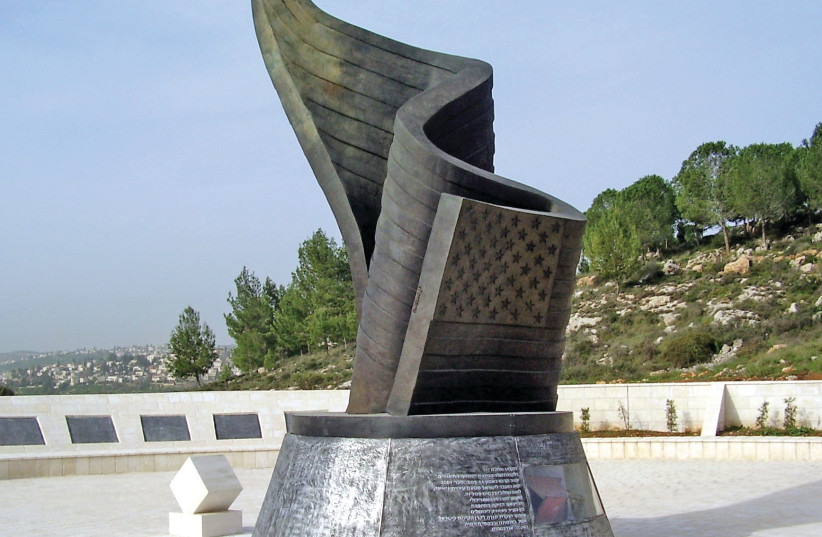US-Israel ties have gone from strength to strength since 2001

Sharon's ‘Israel will not be Czechoslovakia’ comments for a time endangered US-Israel relations.
Earlier this year, I took El Al flight LY2521 to Prague alongside scores of Israeli tourists eager to see the sites of the Czech capital: the famed Prague Castle, the medieval old town, and the historic Jewish quarter. But, typically for me, the visit inspired thoughts that were first and foremost political.
My immediate association with Prague was of a crisis in US-Israel relations in October 2001, following the 9/11 al-Qaeda terrorist attacks on New York and Washington. I was then a diplomat serving at Israel’s embassy in the US. Like many others, I presumed that the common battle against terrorism would see the two allies working even closer to combat the joint threat.
Common battle against terror
At the time, Israel was suffering from the Second Intifada’s recurrent suicide bombings, with their multiple casualties. It was thought that with America experiencing firsthand the horrors of Islamist terror, Washington policymakers would now better comprehend the realities that Israelis had been experiencing daily.
Even Palestinian leader Yasser Arafat understood he had a problem. His security forces suppressed spontaneous expressions of joy that occurred in the aftermath of al-Quaeda’s attacks. But having no security presence in Jerusalem, he was unable to do so there, and the pictures from the Damascus gate of Palestinians celebrating America’s tragedy were widely circulated.
On September 12, the image-conscious Arafat hurried to Gaza’s Shifa Hospital to be photographed donating blood for the victims of 9/11 – although it is doubtful that the PLO chairman’s donation ever made it to New York.
But if Palestinian leaders engaged in damage control, Israelis too would have their challenges. The early hopes for a new period of enhanced US-Israel cooperation were soon replaced by fears of a negative trajectory in US foreign policy.
In the weeks after 9/11, there was much talk in Washington that waging a successful war on the militant Islamists would require president George W. Bush to focus on forging even stronger bonds with Arab and Muslim states. It was argued repeatedly that only thus could America isolate, neutralize and defeat the terrorists.
Traumatic history
FOR THE ever-anxious Israelis, such ideas echoed a traumatic historic precedent. In May 1939, with World War II imminent, the British adopted the anti-Zionist Palestine White Paper. London understood that the Jews would have no choice but to back Britain in its upcoming conflict with Nazi Germany, while Arab support was far from certain and required incentivization.
Accordingly, London announced its opposition to Jewish statehood and simultaneously curtailed immigration to the homeland, leaving millions of Jews trapped in Europe to face Hitler’s Final Solution.
Israel’s prime minister Ariel Sharon, elected in February 2001 to subdue rampant Palestinian terrorism, was 11 years old when the White Paper was issued. And upon hearing reports that America’s war on terror would demand prioritizing US ties with the Arab world, he began to worry.
On October 5, the prime minister gave public expression to his concerns, and in language deemed undiplomatic he stated: “Do not try to appease the Arabs at our expense.’’ Using a sensitive historical comparison, he warned against courting the Arab world the way European democracies had engaged with Hitler on the eve of World War II:
“Don’t repeat the terrible mistakes of 1938, when the enlightened democracies in Europe decided to sacrifice Czechoslovakia for a comfortable, temporary solution.’’ Sharon emphasized: “Israel will not be Czechoslovakia.’’
He was referring to the Munich Agreement of September 1938, when Britain and France betrayed Czechoslovakia for a deal with Nazi Germany. Prague had been facing the threat of German aggression for months, Berlin’s pretext being the “plight” of the ethnic Germans of the Sudetenland, the Nazis championing their “right of self-determination.”
While democratic Czechoslovakia was willing to be forthcoming toward its German minority, Hitler had instructed the Sudeten leadership to never accept a “yes,” always escalating demands to make an agreed solution impossible.
After stroking the crisis, Germany’s Führer threatened an invasion; the Western powers, then in appeasement mode, placated him. British prime minister Neville Chamberlain did not believe the Sudetenland was worth war, saying that Britain should not get involved in a “quarrel in a faraway country, between people of whom we know nothing.”
Chamberlain’s diplomacy led to the four-power Munich Agreement – between Britain, France, Germany and Italy – in which the Sudetenland was ceded to the Nazi Reich. Prague was not a party to the talks but felt compelled to accept the outcome.
Chamberlain was confident that he had averted war and declared the achievement of “peace in our time.” The Nazis had other plans. Berlin swallowed up the Sudetenland with its fortifications and defenses; some six months later it attacked and destroyed the rump Czechoslovak state – forever making the Munich Agreement synonymous with diplomatic folly.
Diplomatic firestorm
IT WAS therefore understandable that Sharon’s Czechoslovakia comments would ignite a diplomatic firestorm. White House spokesperson Ari Fleischer responded: “The president believes that these remarks are unacceptable. Israel could have no better or stronger friend than the United States and no better friend than President Bush.”
Sharon realized he had gone too far in his Bush-Chamberlain analogy. Key Jerusalem-based American correspondents received phone calls on October 7 from the prime minister: “Unfortunately, the metaphor in my words was not understood correctly, and I’m sorry about that.” The reporters, having repeatedly seen interview requests turned down, were now pleasantly surprised to find Sharon eager to talk.
The public apology ended the crisis, and as the optimists had initially predicted, in the years after 9/11, US-Israel ties did indeed go from strength to strength.
Postscript: In 1945-46, newly liberated Czechoslovakia expelled the Sudeten Germans, and an estimated 2.5 million people were forcibly transferred to Germany. The deportations were often harrowing and sometimes violent, with thousands of deaths among those ousted.
Despite this “ethnic cleansing,” Prague’s post-war democratic leaders, president Edvard Benes and foreign minister Jan Masaryk, remained respected European statesmen. It was widely perceived that a domestic national minority, which had collaborated with the hostile designs of an aggressive neighbor to destroy the democratic state where it lived, was only receiving just deserves.
It was not just the Sudeten Germans who were compelled to abandon their homes. Following World War II, tens of millions across Europe, Asia and the Middle East were forcibly displaced, including the Jews of the Arab lands. Yet, for myriad reasons, it is the Palestinian refugee saga that eclipses all others in receiving ongoing international attention.
The writer, formerly an adviser to the prime minister, is chair of the Abba Eban Institute for Diplomacy at Reichman University. Connect with him on LinkedIn, @Ambassador Mark Regev.
Jerusalem Post Store
`; document.getElementById("linkPremium").innerHTML = cont; var divWithLink = document.getElementById("premium-link"); if (divWithLink !== null && divWithLink !== 'undefined') { divWithLink.style.border = "solid 1px #cb0f3e"; divWithLink.style.textAlign = "center"; divWithLink.style.marginBottom = "15px"; divWithLink.style.marginTop = "15px"; divWithLink.style.width = "100%"; divWithLink.style.backgroundColor = "#122952"; divWithLink.style.color = "#ffffff"; divWithLink.style.lineHeight = "1.5"; } } (function (v, i) { });

